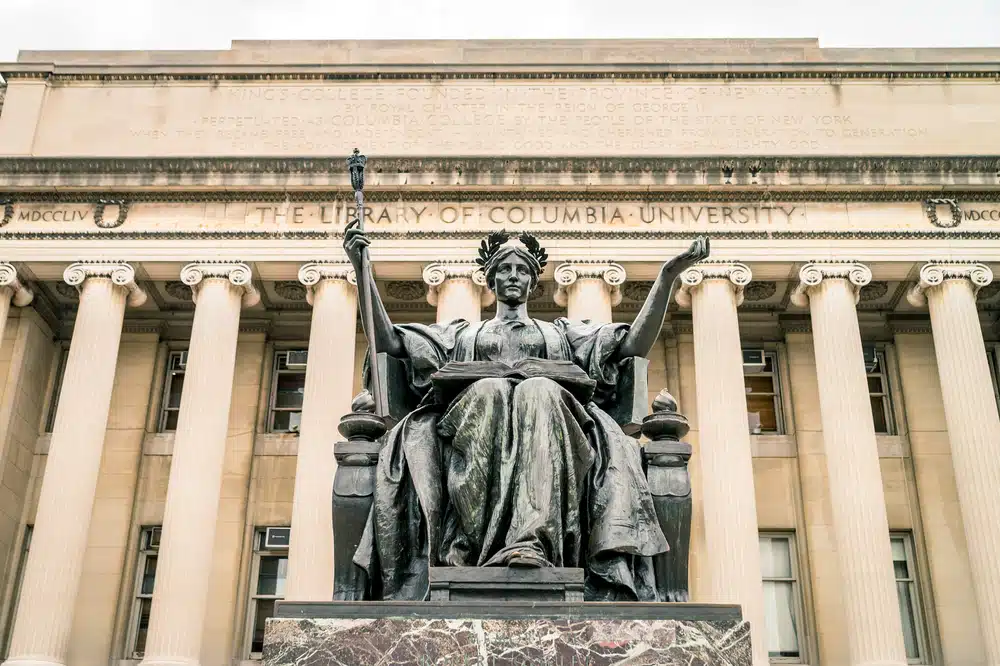A Closer Look at Columbia Medical School
Columbia Medical School, officially known as the Vagelos College of Physicians and Surgeons, is an esteemed institution dedicated to providing top-notch medical education and fostering groundbreaking research. Nestled within the Washington Heights neighborhood of New York City, the vibrant campus offers students access to state-of-the-art facilities and resources in one of the world’s most diverse and dynamic cities.
Columbia University Medical School maintains a strong affiliation with the New York-Presbyterian Hospital, one of the nation’s leading academic medical centers, which enables students to gain valuable clinical experience and training through various rotations and internships.
Founded in 1767 as King’s College Medical School, Columbia Medical School is the oldest medical school in New York State and is known as the second oldest in the United States. Throughout its storied history, the institution has cultivated a reputation for excellence and innovation, producing numerous leaders and pioneers in medicine.
The faculty, students, and alumni at Columbia Medical School continue to shape the future of healthcare, driven by their commitment to improving human health through education, research, and clinical care.
Academic Programs at Columbia Med School
Doctor of Medicine (MD) Program
The Doctor of Medicine (MD) program at Columbia Med School offers a comprehensive and innovative curriculum designed to train future physicians with a strong foundation in medical knowledge, clinical skills, and research experience. The program is structured around three major components: Fundamentals, Major Clinical Year, and Differentiation and Integration.
The Fundamentals phase, which spans the first 18 months of the program, focuses on providing students with a solid understanding of the basic sciences, human anatomy, and the principles of patient-centered care. During the Major Clinical Year, students immerse themselves in various clinical rotations, gaining hands-on experience in diverse medical specialties while honing their diagnostic and treatment skills.
The Differentiation and Integration phase allows students to explore their interests and career aspirations through electives, sub-internships, research projects, and other specialized learning experiences. Furthermore, Columbia Medical School provides numerous dual degree options for students who wish to complement their MD education with additional interdisciplinary knowledge, including MD/Ph.D., MD/MBA, MD/MPH, and MD/MS programs.
These dual degree academic programs allow students to delve into fields such as biomedical research, healthcare management, public health, and medical informatics, preparing them for diverse career paths within the ever-evolving landscape of medicine.
Ph.D. and Master’s Programs
Columbia University Medical School offers a wide range of Ph.D. and Master’s programs designed to train the next generation of scientists, healthcare professionals, and leaders in various interdisciplinary fields. The Biomedical Sciences Ph.D. program equips students with advanced knowledge in cutting-edge research methodologies, fostering the development of innovative solutions to complex medical challenges.
The Biomedical Informatics program, available at both the Master’s and Ph.D. levels, focuses on the intersection of healthcare and technology, preparing graduates to harness the power of data and computational tools to improve patient care and outcomes.
The Master’s in Genetic Counseling program is designed to train compassionate and skilled professionals who can help patients and their families comprehend the complex world of genetic testing and its implications for their health.
The Narrative Medicine program, a unique Master’s degree offering, emphasizes the importance of storytelling and empathy in healthcare by teaching students to effectively communicate with patients, colleagues, and the broader public.
Additionally, Columbia University Medical School provides various other specialized programs that cater to diverse interests and career goals, such as the Master’s in Nutrition, Master’s in Epidemiology, and Ph.D. in Sociomedical Sciences.
These graduate programs collectively aim to produce well-rounded and knowledgeable professionals capable of significantly contributing to the ever-evolving landscape of healthcare and biomedical research.
Residency and Fellowship Programs
In collaboration with New York-Presbyterian Hospital, Columbia Medical School offers a wide range of residency and fellowship programs across numerous medical specialties and subspecialties. These programs provide rigorous training and education to prepare physicians for successful careers in academic medicine, clinical practice, and research.
Residents and fellows benefit from a diverse patient population, state-of-the-art facilities, and dedicated faculty who are leaders in their respective fields. The programs emphasize the development of clinical expertise, research skills, and teamwork, ensuring that graduates are well-equipped to deliver exceptional patient care and contribute to advancing medical knowledge in their chosen disciplines.
Research Opportunities at Columbia Med School
Basic and translational research
Basic and translational research is crucial to advancing medical knowledge and improving patient care. Basic research delves into the fundamental mechanisms underlying biological processes, diseases, and potential treatments, providing a solid foundation for developing new therapies and diagnostic tools. Translational research, on the other hand, bridges the gap between basic science discoveries and their application in clinical settings.
It involves developing and evaluating novel therapeutic interventions, diagnostic techniques, and preventive measures, ultimately aiming to bring these innovations from the laboratory to the patient’s bedside. Together, basic and translational research drive the progress of medical science and contribute to the ongoing quest for better, more effective healthcare solutions.
Clinical research
Clinical research is vital in order to advance medical knowledge and enhance patient care. It encompasses the study of new treatments, diagnostic methods, and preventive strategies in real-world clinical settings, aiming to improve health outcomes and quality of life for patients.
Clinical research often involves the collaboration of healthcare professionals, researchers, and patients through well-designed clinical trials that systematically evaluate novel interventions’ safety, efficacy, and effectiveness.
This type of research is instrumental in translating scientific discoveries into evidence-based medical practice, ensuring that healthcare providers are equipped with the most up-to-date and reliable information in order to make informed decisions for their patients.
Centers and Institutes
Columbia Med School hosts numerous prominent centers and institutes that foster interdisciplinary research, promoting collaboration among researchers, clinicians, and students across various disciplines. Such prominent centers include the Irving Comprehensive Cancer Center, the Zuckerman Mind Brain Behavior Institute, and the Taub Institute for Research on Alzheimer’s Disease and the Aging Brain.
These centers bring together experts from diverse fields, such as genetics, neuroscience, immunology, and epidemiology, facilitating innovative approaches to understanding complex health issues and developing novel treatments.
By fostering interdisciplinary research, Columbia Medical School encourages the exchange of ideas and the integration of expertise, ultimately driving the progress of medical science and the development of more effective healthcare solutions.
Student research opportunities
Columbia Med School is committed to providing students with ample research opportunities to enrich their educational experience and prepare students for future careers in medicine and research. Summer research programs allow students to engage in focused research projects under the guidance of experienced faculty members, often leading to presentations at conferences or publications in scientific journals.
Additionally, longitudinal research projects offer students the opportunity to delve deeper into specific research questions over an extended period, fostering the development of critical thinking, problem-solving, and collaboration skills. These research experiences enhance students’ understanding of the scientific process and its relevance to clinical practice and provide a solid foundation for those interested in pursuing careers in academic medicine or research.
Columbia Medical School Admissions Process
1. Application requirements
The application process for Columbia Medical School is designed to evaluate prospective students holistically, considering a wide range of factors demonstrating their potential for medical success. The Medical College Admission Test is a key applicant requirement. It is a standardized measure of their knowledge and aptitude in the core scientific and reasoning areas relevant to medical education.
Letters of recommendation are another crucial component of the application. They provide insight into the applicant’s character, academic abilities, and potential for growth from those who have closely interacted with them. Transcripts and coursework are also carefully reviewed to assess the applicant’s academic background and performance in prerequisite subjects, ensuring they possess the necessary foundation to excel in the rigorous medical school curriculum.
The personal statement, along with a description of extracurricular activities, allows applicants to showcase their motivations for pursuing a career in medicine and the personal qualities, experiences, and achievements that make them unique and well-suited for the medical profession.
Overall, the application requirements at Columbia University Medical School aim to provide a comprehensive understanding of each applicant’s potential, considering their intellectual abilities, interpersonal skills, and commitment to the field of medicine.
2. Interview process
The interview process at Columbia Medical School is a crucial aspect of the Columbia medical school Admissions process, as it allows applicants to personally engage with faculty members, current students, and admissions staff. The interviews are designed to assess the applicant’s communication skills, critical thinking abilities, and motivation for pursuing a medical career.
It also allows the applicants to learn more about the school’s program, culture, and community, ensuring they can make an informed decision if accepted. Applicants may participate in traditional one-on-one interviews, group interviews, or interactive scenarios during the interview process. This allows the admissions committee to evaluate their ability to think on their feet, collaborate with others, and demonstrate empathy and professionalism.
The interview process ultimately plays a pivotal role in the holistic evaluation of applicants, ensuring that those who are admitted to Columbia Med School are not only qualified academically but also possess the personal qualities necessary to excel in the medical profession.
3. Selection criteria and competitiveness
The selection criteria for Columbia University Medical School are designed to evaluate applicants holistically, considering a wide range of factors that demonstrate their potential to succeed in the medical field. In addition to strong academic performance and competitive MCAT scores, the admissions committee considers applicants’ personal qualities, experiences, and commitment to medicine.
Factors such as leadership abilities, community involvement, research experiences, and a demonstrated passion for healthcare are important in the selection process. Given its prestigious reputation and the high quality of education it offers, Columbia Med School is highly competitive, attracting many accomplished and motivated applicants from diverse backgrounds each year.
The admissions committee seeks to admit a diverse and talented group of medical students who have the intellectual aptitude for medical education and possess the qualities necessary to thrive in the medical profession and contribute positively to the healthcare community.
4. Financial aid and scholarships
Columbia Medical School is committed to making medical education accessible and affordable for all medical students, regardless of their financial background. The school offers a variety of financial aid options, including need-based grants, scholarships, and low-interest loans, to help medical students manage the cost of their education. In some cases, merit-based scholarships are also available to recognize exceptional achievements and potential.
Prospective and current students are encouraged to apply for financial aid by submitting the necessary documentation, such as the Free Application for Federal Student Aid (FAFSA) and the CSS Profile, allowing the school to determine each student’s financial need and create a tailored aid package. Columbia Medical School’s dedication to providing financial support ensures that talented and motivated students can pursue their medical education without financial constraints.
Columbia University Med School Alumni
Notable alumni
Columbia University Med School has a rich history of producing notable alumni who have significantly contributed to the medical field and beyond. These distinguished graduates have excelled in various roles, such as pioneering researchers, renowned physicians, and influential leaders in healthcare and academia.
Some of these notable alumni include Dr. Robert Gallo, a prominent biomedical researcher who co-discovered HIV as the cause of AIDS; Dr. Eric Kandel, a Nobel Prize laureate for his groundbreaking work in the field of neuroscience and memory; Dr. Allen Hynek, a prominent astronomer, and ufologist; and Dr. Virginia Apgar, the creator of the Apgar Score, a critical assessment tool for newborn health.
These illustrious alumni are inspiring examples of the impact that Columbia University Medical School graduates can have on healthcare, scientific discovery, and the betterment of society.
Alumni engagement and networking opportunities
Columbia Medical School fosters a strong sense of community and connection among its alumni through various engagement and networking opportunities. Alumni are encouraged to stay involved with the school by attending reunions, participating in regional events, and engaging with current students through mentorship programs or guest lectures.
Additionally, the school offers a range of professional development resources, such as career services and continuing education programs, to support alumni throughout their careers. The Columbia Med School alumni network is a valuable resource for graduates, providing them with a lifelong connection to their peers, faculty, and the institution. This strong community fosters collaboration, professional growth, and a shared commitment to advancing healthcare and medical knowledge.
Career outcomes and achievements
Graduates of Columbia Med School consistently demonstrate strong career outcomes and achievements, reflecting the high-quality education and training they receive during their time at the institution. Alumni have pursued successful careers in various medical fields, including academic medicine, clinical practice, research, healthcare administration, and public health.
Columbia Medical School graduates are well-prepared to excel in competitive residency programs and fellowships across various medical specialties. The school’s strong emphasis on research, patient-centered care, and interdisciplinary collaboration equips graduates with the knowledge, skills, and professional network necessary to significantly contribute to the medical field and improve healthcare outcomes for patients and communities worldwide.
Now that you have an idea about Columbia Medical School, your college admissions to that university should be next on your mind. To ensure that you get into Columbia, you can get help with AdmissionSight. With ten years of experience working with college admission experts, AdmissionSight can help you get into Columbia Medical School. You can talk to our experts today to get an initial consultation.









































